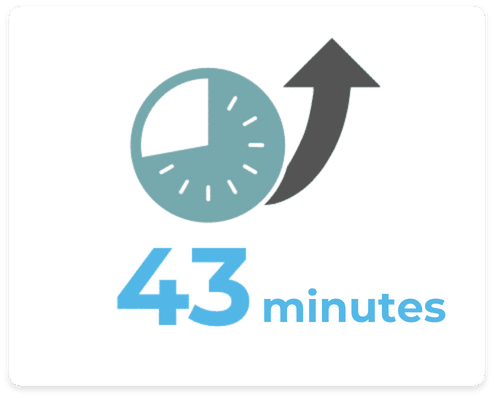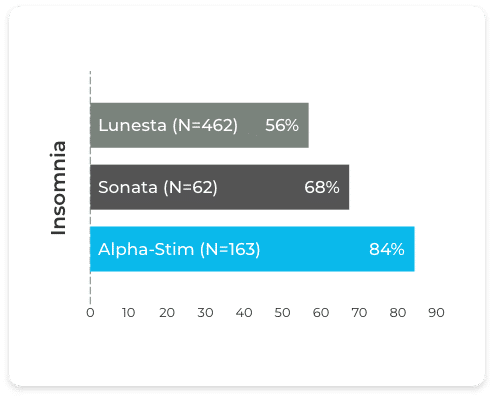What Can a Lack of Sleep Do to My Body?
Sleep is crucial to your health and well-being. And we mean everything. From having energy to focus and think clearly, to going on a morning run, to regulating your emotions, gut, and hormones.
A lack of sleep can disrupt normal bodily functions and slow down your body and brain’s ability to function at their best.
What a Lack of Sleep Can Cause
1. Emotional Dysregulation
Feeling frustrated, irritable, or like you can’t get control of your emotions? That’s from not getting enough sleep. And when you go longer without enough good quality sleep, your body can enter a negative feedback loop, which can worsen both sleep and mental health.
In one study, the University of Pennsylvania researchers found that subjects who slept only 4.5 hours a night for one week reported feeling more stressed, angry, sad, and mentally exhausted. And when the same individuals resumed a normal sleep schedule, they also reported a dramatic improvement in their mood.
Going without sleep can:
- Cause irritability and stress
- Lead to the development of a mood disorder
- Make you feel more angry and frustrated
- Heighten your emotional reactions to positive and negative situations
- Make it harder to regulate your emotions
- Make depression worse
- Can blunt positive emotions, making it harder to feel excited, happy, or even content
- Decrease your ability to feel pleasure or enjoyment from activities you usually love
- Impair your ability to recognize and interpret emotions in yourself and others
- Result in less control over emotional responses
2. Increased Anxiety
Ever notice how when you’re sleep deprived, you’re more easily agitated, stressed, more easily angered, and have trouble focusing? That’s because there is a strong link between sleep deprivation and increased anxiety.
And data backs this up. “Sleep deprivation makes us less happy, more anxious” is the title of a study summary from the American Psychological Association after they synthesized more than 50 years of research on sleep deprivation and mood. One of the study authors, Cara Palmer, PhD, said, “This study represents the most comprehensive synthesis of experimental sleep and emotion research to date, and provides strong evidence that periods of extended wakefulness, shortened sleep duration, and nighttime awakenings adversely influence human emotional functioning.” The researchers found that a lack of sleep resulted in fewer positive emotions (joy, happiness, contentment) and increased anxiety symptoms (increased worrying, rapid heart rate).
The link between sleep and anxiety:
- Anxiety can cause restless sleep
- Increased anxiety can make sleep issues worse
- Sleep problems can increase anxiety levels and make it harder to cope with daily stressors
- Not enough sleep can make existing anxiety symptoms worse
- Insufficient sleep over time can cause an anxiety disorder
3. Hormone Issues
Not getting enough sleep can impact hormone levels big time. And, the reverse is true as well. When hormones are deregulated, your sleep quality can also diminish. A lack of sleep can disrupt the release of critical hormones (ones that impact your metabolism, weight, ability to sleep, and more).
Specifically, sleep deprivation can disrupt the release of cortisol, melatonin, leptin, ghrelin, estrogen, progesterone, and thyroid hormones. Poor sleep also interferes with your circadian rhythm, and this is your body’s internal clock it uses to regulate hormone release. When the circadian rhythm is interfered with, this can cause further hormonal imbalances.
4. Weight Gain
Did you see us mention cortisol, leptin, and ghrelin above? Yep. When sleep disrupts these hormones, it causes a significant impact on weight management.
Why? Those hormones are responsible for appetite, metabolism, and overall energy expenditure. When they are unbalanced, this can lead to increased hunger, decreased feelings of fullness, and slow down your metabolism. As a result of less sleep, your body may either be burning fewer calories, or you could end up eating more, and as a result, gain weight.
Cortisol increases can also lead to increased fat storage, so as cortisol levels become more unbalanced (higher) due to sleep deprivation, your body is triggered to think it’s in danger or will store more fat.
Sleep longer and better with Alpha-Stim®
Alpha-Stim is something many are choosing to help with insomnia and improve both the amount of time they sleep and the quality of sleep they get. It’s not like melatonin, which can make you feel hungover the next morning, either. Alpha-Stim is a drug-free alternative and something that can also help relieve anxiety.

INCREASED SLEEP TIME
After only 5 treatments, military Service Members with insomnia reported an increase of 43 minutes of sleep.1

IMPROVED SLEEP QUALITY

Preferred Over Medication

Also Treats Anxiety
Alpha-Stim is also designed to treat anxiety, providing patients with simultaneous anxiety and insomnia relief.
Sources:
- https://www.ama-assn.org/delivering-care/public-health/what-doctors-wish-
- https://www.columbiapsychiatry.org/news/how-sleep-deprivation-affects-your-mental-health
- https://www.bannerhealth.com/healthcareblog/teach-me/how-sleep-can-affect-stress
- https://www.healthline.com/health/sleep/how-sleep-can-affect-your-hormone-levels
- https://www.sleepfoundation.org/mental-health/anxiety-and-sleep
- Dinges, D. et al., Cumulative Sleepiness, Mood Disturbance, and Psychomotor Vigilance Decrements During a Week of Sleep Restricted to 4 – 5 Hours Per Night, Sleep. 1997 Apr; 20 (4): 267–277.
- https://pmc.ncbi.nlm.nih.gov/articles/PMC2831427/
- https://www.webmd.com/sleep-disorders/features/insomnia-emotional-toll
- https://www.ynhhs.org/articles/does-lack-of-sleep-cause-weight-gain
- https://www.healthline.com/nutrition/sleep-and-weight-loss
- Lande RG, Gragnani C. Efficacy of Cranial Electric Stimulation for the treatment of insomnia: A randomized pilot study. Complementary Therapies in Medicine. 2013; 21(1):8-13.
- Lichtbroun AS, Raicer MMC, Smith RB. The treatment of fibromyalgia with Cranial Electrotherapy Stimulation. Journal of Clinical Rheumatology. 2001; 7(2):72-78.
- Kirsch, D.L., Price, L.R., Nichols, F., Marksberry, J.A., & Platoni, K.T. Military Service Member and Veteran Self-Reports of Efficacy of Cranial Electrotherapy Stimulation for Anxiety, PTSD, Insomnia, and Depression. (2014). The Army Medical Department Journal, 46-54.

